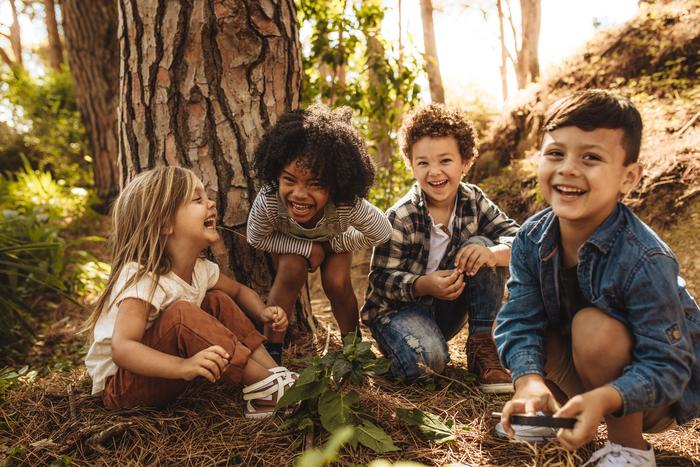Climbing trees, making mud pies, or simply playing outside, parents and educators know that being in nature is an important part of every childhood. But when it comes to messy or risky play, it’s a whole different story according to new research from the University of South Australia.

Credit: “Group of cute kids playing in forest” by Royal Botanic Garden Sydney is licensed under CC BY-NC-ND 2.0.
Climbing trees, making mud pies, or simply playing outside, parents and educators know that being in nature is an important part of every childhood. But when it comes to messy or risky play, it’s a whole different story according to new research from the University of South Australia.
Talking to parents and early childhood educators, researchers found that parents and educators will happily open the door to ‘safe’ or ‘clean’ nature play but are more reluctant to let children engage in ‘messy’ activities or play that may be perceived as ‘risky’.
UniSA researcher and PhD candidate Kylie Dankiw says that parents and educators act as important gatekeepers when it comes to nature play.
“Nature play is well known for its positive effects on children’s health, development, and wellbeing,” Dankiw says, “and this was a common theme when interviewing parents and carers alike.
“Nature play helps improve emotional regulation, physical skills, and learning outcomes, and can encourage children to develop their creativity and imagination.
“Parents and educators also identified that nature play can help children form a connection with the natural world and learn about sustainable practices.
“Importantly, parents and carers felt that nature play experiences could be used to offset technology use such as TV and screens.
“But despite the known benefits, parents and carers can find it difficult when it comes to engaging children in nature play, especially if activities are messy or dirty (such as water or mud play) or are thought of as being risky (such as climbing).
“Educators tell us that safety regulations and time restrictions can limit what they choose as outdoor activities, especially when they need to change children’s clothes after muddy play, or when parents expect for their child to come home clean from childcare.
“There can be a conflict between encouraging children to experience nature, and what adults need to deal with in the so-called aftermath.”
Nearly 50% of Australia’s children aged 0-12 years (two million) spend time in formal or informal early childhood education care, with long day care being the most common type of care for children aged 0-4 years.
Paediatric expert UniSA’s Dr Margarita Tsiros says given the large number of children in care, further education and training for both early childhood educators and parents could help overcome some of the challenges that might be linked with nature play.
“Our research highlights that opportunities for young children to engage in nature play is influenced by other people in their lives,” Dr Tsiros says.
“While parents and educators recognise the benefits of nature play, they can struggle with certain aspects of being in nature, particularly risk.
“Understanding these barriers can help inform strategies to promote nature play for different age groups. It can also help inform policies and practices to promote enabling factors.
“A key move will be to boost educators’ knowledge about nature-based learning, what constitutes nature play, and how they can use natural resources to facilitate nature play experiences.
“In a time where screens threaten to consume children’s interest, it’s vital that we present opportunities for them to engage in nature play, and to achieve this, we need to have parents and educators on board.”
…………………………………………………………………………………………………………………………
Contacts for interview:
Kylie Dankiw E: [email protected]
Media contact: Annabel Mansfield M: +61 479 182 489 E: [email protected]
Journal
PLoS ONE
DOI
10.1371/journal.pone.0286468
Method of Research
Case study
Subject of Research
People
Article Title
Parent and early childhood educator perspectives of unstructured nature play for young children: A qualitative descriptive study
Article Publication Date
7-Jun-2023
COI Statement
NA




